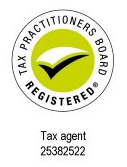Tips for Share Investors
Exchange traded funds (ETFs) are an increasingly popular investment product but calculating the tax on them can be complicated. Because ETFs are classified as trusts, not ordinary company shares, they fall under the Attribution Managed Investment Trust (AMIT) rules. If you invest in shares or Exchange Traded Funds (ETFs) you will have to report capital gains from the sale of shares or income in the form of dividends and distributions on your income tax return. You will also have to pay tax on dividends and distributions automatically reinvested into a reinvestment plan.
If you have made a capital loss when selling your shares, the capital loss can only be offset against capital gains. Investors who don’t have a capital gain in the same income year to absorb the loss can declare the loss in their tax return and carry it forward to future years to offset against future capital gains.
The Australian Tax Office (ATO) generally uses data obtained from the Australian Securities and Investments Commission (ASIC), brokers, exchanges and share registers on dividend payments and the purchase and sale of shares to pre-fill your tax returns. It is then up to you to check that all relevant data has been included.
Record-keeping is also very important to evidence information in your tax return and we recommend that you keep the following records:
- Date of the purchase or reinvestment and purchase amount or value (e.g. details of any share split, share consolidation, returns of capital, takeovers, mergers, demergers and bonus share issue events);
- Date of sale and sale price;
- Details of capital losses made in previous years; and
- Brokerage costs or commissions paid to brokers when shares were bought and sold (e.g. dividend or managed investment distribution statements should contain details of these costs).
Investment products
Towards the end of the financial year, there is often an uptick in the promotion of investment products that may claim to be tax effective.
Check to see if a Product Ruling is available or if a Taxpayer Alert has been issued by the ATO.
A product ruling provides ATO assurance on the tax consequences of an arrangement, provided it is carried out as described in the ruling. However, it isn’t a sanction or guarantee of the tax effectiveness of a product or investment.
Taxpayer alerts are warnings issued by the ATO about higher risk arrangements or issues.
You should form your own view about the commercial and financial viability of a product. Consider issues such as whether the projected returns are realistic, the ”track record” of the management, the level of fees compared with similar products, and how the investment fits an existing portfolio.
If you are considering such an investment, you should seek independent advice from a licensed financial advisor before making a decision.





